Friday
Community ArticlesCompassion and Gardening
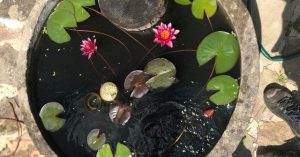 Sometimes I struggle to feel compassion for another human individual or humanity in general. I cannot always connect easily to my compassionate nature. I feel stuck in a flow of chattering irritation, judgement or anger and my empathy does not flow easily. There. I said it out loud. I don’t care if the woman sitting next to me on the Metro has lost her mobile phone – I am reading. I am not interested in my neighbour’s woeful tale of partner problems – I have laundry to do. I wish my friend would find someone else to talk about the death of her beloved cat – I have to cook for guests. As I write this, I am guessing that we all feel this struggle sometimes.
Sometimes I struggle to feel compassion for another human individual or humanity in general. I cannot always connect easily to my compassionate nature. I feel stuck in a flow of chattering irritation, judgement or anger and my empathy does not flow easily. There. I said it out loud. I don’t care if the woman sitting next to me on the Metro has lost her mobile phone – I am reading. I am not interested in my neighbour’s woeful tale of partner problems – I have laundry to do. I wish my friend would find someone else to talk about the death of her beloved cat – I have to cook for guests. As I write this, I am guessing that we all feel this struggle sometimes.
Fortunately, I have a means of dealing with such a scenario. I return to the earth, to the rocks and soil and plants and creatures. I take my practice into the garden. We can all do this.
Let’s begin by defining, simply, compassion. “Co” means together and “passion” means feeling strongly, so compassion is a strong feeling of togetherness – or perhaps empathy. It’s a natural assumption to make that we can only feel compassion for other humans and animals – beings that breathe and that we can easily relate to. We could drop that dualistic notion and turn instead to a more eco-centric compassion. Why? Because rocks and earth and plants have the capacity to help us expand and deepen our compassion at times when we find relating to other humans challenging.
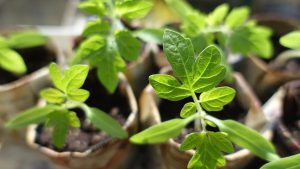 In the garden, seedlings call us constantly, like new-born babies. They need us, and we give unconditionally. We administer water, light, warmth, shade, and nourishment at very regular intervals. As with a baby, we rise early to attend to their needs, and late in the evening one of us is still with them. We don’t feel inconvenienced. This care is unconditional; it comes easily and naturally. We have compassion. We give love.
In the garden, seedlings call us constantly, like new-born babies. They need us, and we give unconditionally. We administer water, light, warmth, shade, and nourishment at very regular intervals. As with a baby, we rise early to attend to their needs, and late in the evening one of us is still with them. We don’t feel inconvenienced. This care is unconditional; it comes easily and naturally. We have compassion. We give love.
Sometimes sick plants require extra support. The other day a plum tree lost three branches in a storm. And so, we found ourselves at 7:00 a.m., clambering up a sturdy trunk, removing broken branches, and administering a healing balm to the wounded tree in a soft dew-laden dawn after the storm. We felt for the plum tree, and this work was practice. Practice in that our self-delusions dissolved and we became sensitive to another.
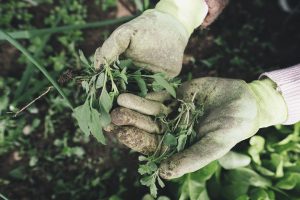 Our garden is always full of weeds. As in any permaculture garden they are an ever-present reminder of the ways of nature. We don’t judge our weeds, or curse them, or feel like we are doing battle with them. We don’t know everything, but we possess some wisdom, and so we know that weeds are here to heal the soil.
Our garden is always full of weeds. As in any permaculture garden they are an ever-present reminder of the ways of nature. We don’t judge our weeds, or curse them, or feel like we are doing battle with them. We don’t know everything, but we possess some wisdom, and so we know that weeds are here to heal the soil.
Each plant or weed tells us something about the land we work. A drift of sturdy-rooted nettles tells us we have an excess of nitrogen in the soil. A bank of buttercups comes in to contain loose earth and help rebuild the soil. The appearance of thistles in our herb beds lets us know that deep down the soil is compacted, and the deep roots of our spiky friends can de-compact the soil far beneath the surface.
Weeds are our wisdom and a way to read the soil, and because of this we feel compassion for them. Weeds are our friends. Of course we have to remove weeds to give space to our vegetables and herbs and flowers, but we don’t discard them. We place them back on the beds so that they can continue giving as mulch.
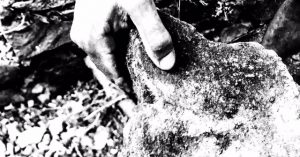 It is possible to feel for soil too. We have compassion for the earth we work with every day. This compassion too is inextricably linked with our wisdom. We know the land well. Our bare hands – and often our bare feet – know its needs. Our constant and sensual perception of the soil allows us to cultivate awareness of its needs. Too wet, too dry, too soft, too hard – we are there, aware and caring. We observe which beds are full of wildlife: nests of woodlice, snails laying eggs, families of field-mice, fat toads hiding in the damp mulch. These creatures tell us as much about the land as the weeds do.
It is possible to feel for soil too. We have compassion for the earth we work with every day. This compassion too is inextricably linked with our wisdom. We know the land well. Our bare hands – and often our bare feet – know its needs. Our constant and sensual perception of the soil allows us to cultivate awareness of its needs. Too wet, too dry, too soft, too hard – we are there, aware and caring. We observe which beds are full of wildlife: nests of woodlice, snails laying eggs, families of field-mice, fat toads hiding in the damp mulch. These creatures tell us as much about the land as the weeds do.
And so you see, wisdom and compassion cannot exist without one another. As Masao Abe said: “Compassion without wisdom is not understood to be true compassion, and wisdom without compassion is not true wisdom.”
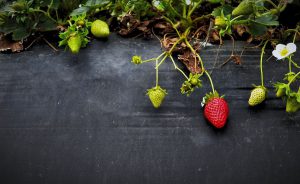 Working in a garden brings us earth wisdom and we begin to see the interdependent nature of our relationships to the soil, plants and animals. The land is our source and without that knowing, we can find ourselves all accommodating and compassionate – our hearts are infinite and can welcome anything.
Working in a garden brings us earth wisdom and we begin to see the interdependent nature of our relationships to the soil, plants and animals. The land is our source and without that knowing, we can find ourselves all accommodating and compassionate – our hearts are infinite and can welcome anything.
Sometimes we find ourselves in a place where relating to humans and all their complexities hurts our heads, and we close our hearts. I think this is OK sometimes. I think it’s normal. I think it’s entirely acceptable to feel irritated with people at times. However, battling this by faking empathy is not so great. Instead, say it out loud: “I can’t connect with my compassionate nature today!”
And then: go to a garden and touch the earth, observe the phenomenal world in its intricate and interdependent magnificence, and perhaps you’ll find compassion comes easy through the land.





Aug 24, 2018
Reply
I like your gardening connections. My gardens, which I tend to carefully, have been stirring for me an unfortunate metaphor.
I recently visited Myanmar, where many Buddhists support their government’s violent ethnic cleansing of Rohingya Muslims.
In my garden, I seem to be segregating plants into their own spaces where they can dominate the area and block intrusion by weeds or other plants. The garden has lots of different plants, all pushing against each other, but each seems to need it’s own space.
Am I practicing unenlightened garden management?